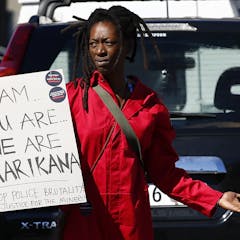
Articles on #feesmustfall
Displaying 1 - 20 of 113 articles

Students want more relatable examples, both of business leaders and of industry case studies.

With over 200 publications to his name, his three most recent books give a sense of why he is so famous as a historian.

Where both capacity and integrity are weak, dysfunction is inevitable.

Despite its vagueness, the RET has become central to the contemporary ANC. It is destined to remain a powerful bloc within the party, and a constant constraint on Ramaphosa leadership.

Individual beliefs about the past and its relevance to the present strongly influenced awareness of the Marikana tragedy.

The commission could have made more of the evidence and been more categorical about when it thought criminality had taken place.

South Africa’s economic challenges and the high number of students from poor and working class families call for a funding model that doesn’t create an affordability crisis for students and the state.

Instead of being a democratic right and legitimate form of expression, protests have increasingly been framed as threats to national security.

Whites lived well under apartheid and it is not absurd for black leaders to want all to live in the same way.

Leading during a crisis: how leaders of higher education institutions can adapt and innovate during uncertain times.

There are individual activists and political groupings who believe violent action is legitimate and use the circumstances to actively drive such behaviour.

An African literature lecturer shares how embodied teaching can help students feel that their lives and stories matter.

Africa is now formally free of colonial rule. Yet, the aim of remembering and furthering the fight for self determination remains relevant as ever.

CC BY-NC-ND8.02 MB (download)
It's important to focus on the challenges facing higher education before the reach a boiling point.

The book depicts how Onkgopotse Tiro’s time at Turfloop amounted to a revolutionising political script for generations to come.

During the apartheid period in South Africa – 1948 to 1994 – a lively intellectual culture of opposition emerged on some of the country’s university campuses and within the broader anti-apartheid movement…

More than ever, South African universities need a new social contract that charts a way forward and begins to heal divisions.

Education remains one of government’s key priority sectors yet it continues to be in a crisis.

South Africa students are protesting and have brought university campuses to a stand still. This could have been avoided.

Certain criteria are needed to lead a university but additional knowledge is also useful.





